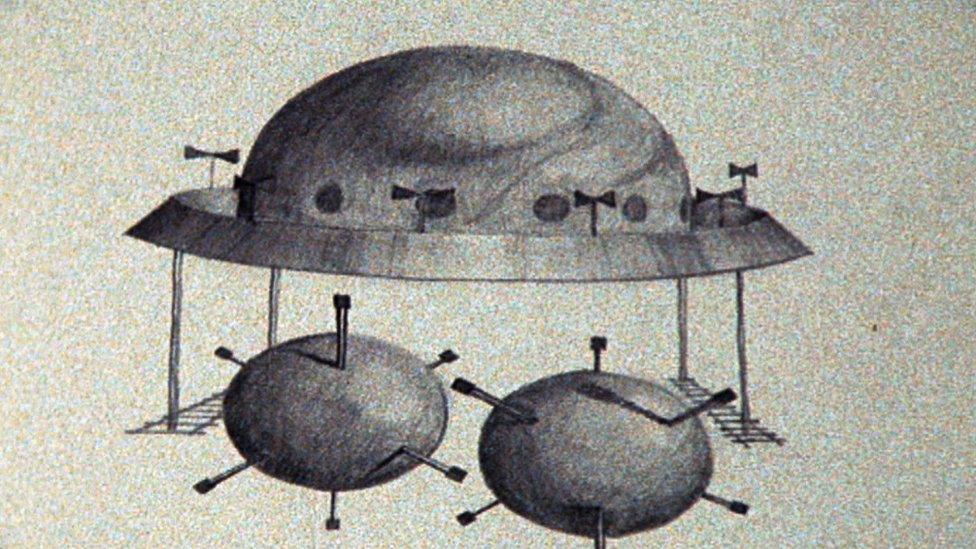The sleuths undecided on UFOs, Bigfoot and ghosts
- Published
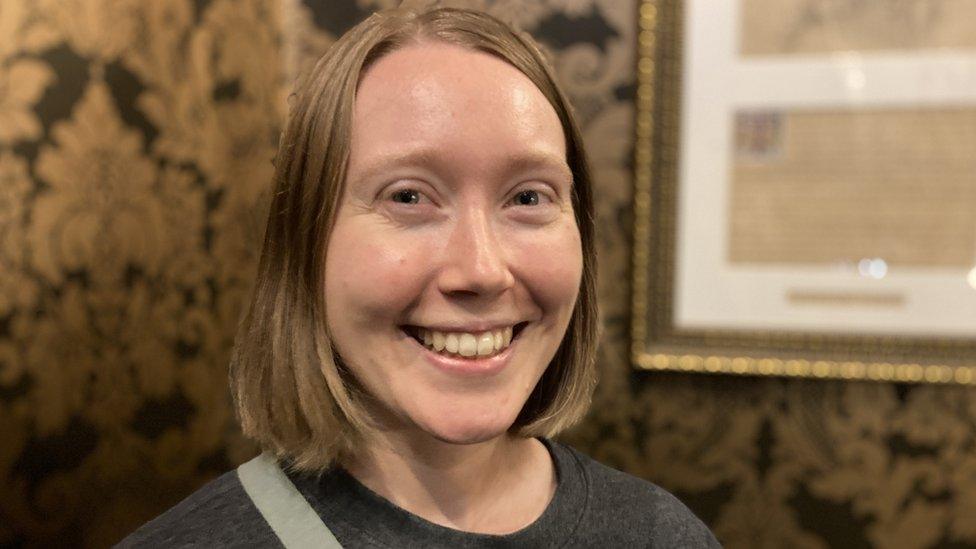
The October meeting was Kerry Charles's first time with the Edinburgh Fortean Society
Kerry Charles was driving on a dark, deserted road on Skye in terrible weather when she saw what she thought was an enormous black wolf.
Wolves have been extinct in Scotland since the 18th Century so Kerry knew it was probably not real.
It could have been her brain interpreting a figure from the rocky and rugged scenery in poor light conditions, she said.
"That made me think: 'I haven't seen something that isn't there before'," Kerry added.
"So I wanted to hear what other people's experiences have been. It got me curious."
Earlier this month, Kerry attended her first meeting of the Edinburgh Fortean Society.
It was founded in 1999 and meets once a month to investigate and analyse phenomena which seem to push the boundaries of accepted scientific knowledge.
Members say that just because science cannot currently explain something, it doesn't mean it never will be able to.
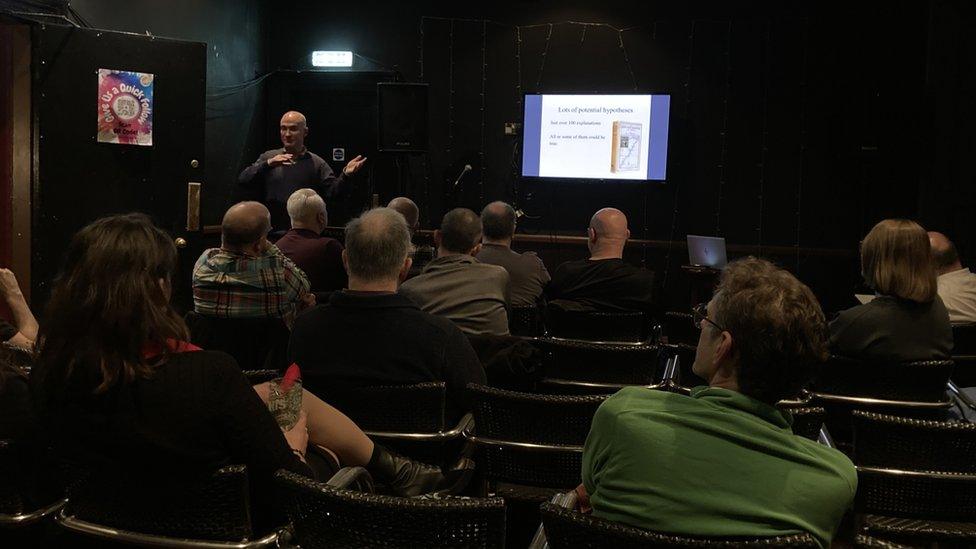
Eddie Cory was among the over a dozen people who attended the society's latest meet
The society is made up of people of varying degrees of scepticism and belief, united over their love of the weird and unexplained.
Eddie Cory, a 59-year-old print finisher and amateur actor, has been a member from the start and although he has never had any Fortean experiences himself he finds the topic fascinating.
He thinks the difference between this group and conspiracy theorists is that the latter tend to distort information to fit their beliefs, whereas Forteans encourage open-mindedness and a willingness to consider various viewpoints.
"We, as Forteans, have an open mind on most things," he said.
"Other people have claimed to have experiences and I'm interested in what those other people feel or want to explain about their particular experiences with unexplained phenomena."
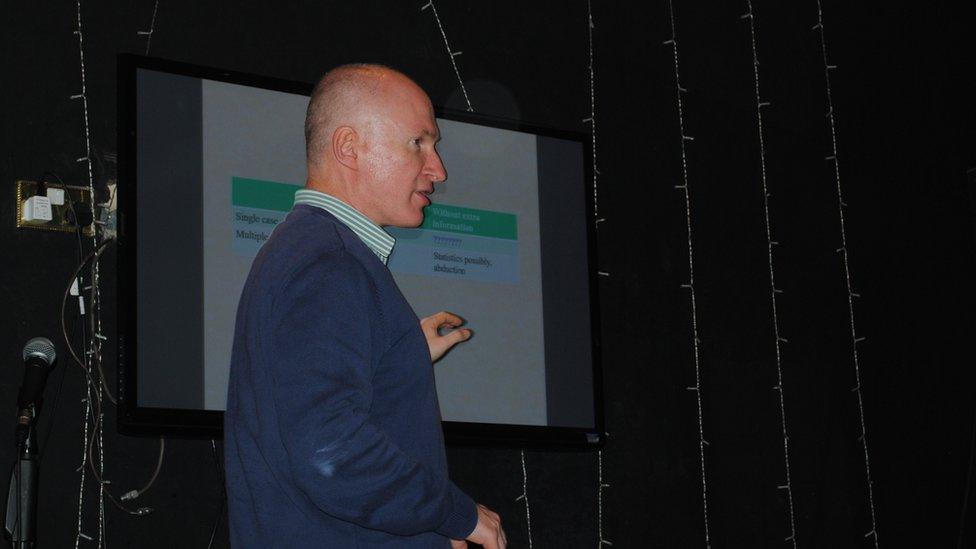
Dr Charles Paxton was the speaker at the society's latest meeting in October
At each of the society's meetings, a member of the group delves into their specific area of interest, which can be anything related to "anomalous phenomena", more commonly known as unexplained events.
These range from urban legends and UFO sightings to reports of the Loch Ness Monster and people's paranormal experiences.
At the society's latest meet - in the top floor of an Edinburgh pub - more than a dozen people gather to listen to Dr Charles Paxton's talk.
Dr Paxton is a statistical and aquatic ecologist who works for the University of St Andrews. He analyses reports of strange experiences in his spare time.
His talk is on how scientific methods can be used to analyse unexplained reports based on singular experiences, much like Kerry's.
This was something that piqued her interest.
"I'm a data analyst and this is someone using it in a very different setting," Kerry says.
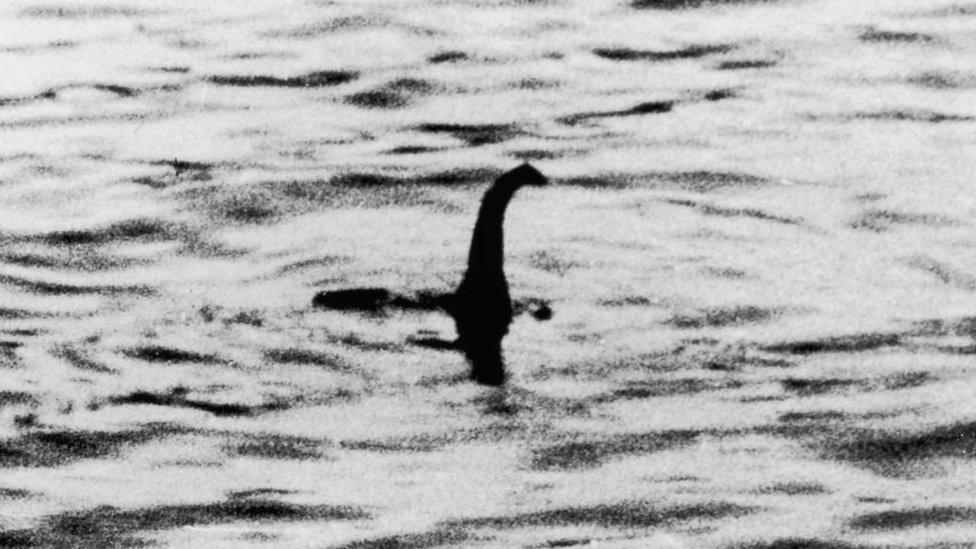
Dr Paxton carried an experiment to see what people perceive different objects in the water as to try and understand what might explain sightings at Loch Ness
Dr Paxton, a lifelong enthusiast of unexplained events, is determined to demonstrate that science can be a useful tool to explore such mysteries.
"Science can be a bit dismissive, but actually we can use the methods of science to explore people's strange experiences and try to explain them," he says.
Dr Paxton has even carried out experiments to see how people perceived particular encounters, be it a person in a gorilla suit or mysterious objects in the water.
Essentially, he is carrying out a scientific study to try to determine why people believe they have witnessed an unknown primate wandering around North America or a monster in Loch Ness.
"I'm not saying the people who experience seeing the Loch Ness Monster or seeing Bigfoot are lying, I don't think that's the case. I do think they have misinterpreted what they have seen," he says.
"I think that it's really important to think that science can answer all sorts of questions which some people think it can't answer and we can use the tools of science and the methods of science to investigate those sorts of questions."
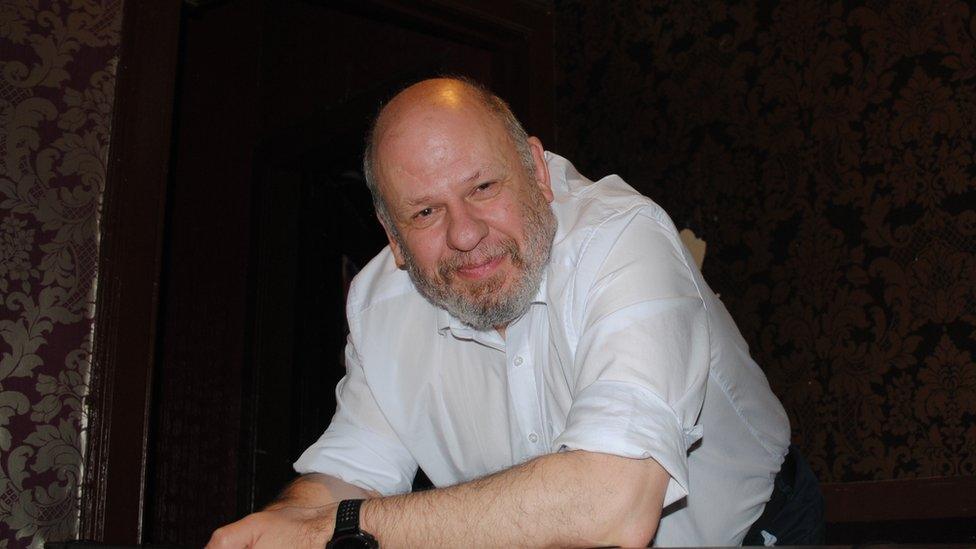
The Edinburgh Fortean Society was founded by Gordon Rutter in the corner of an Edinburgh pub in 1999
The origins of the society's meetings go back to one night in the corner of an Edinburgh pub 24 years ago when Gordon Rutter produced The Book of the Damned by American writer Charles Fort and began reading excerpts from it to his friends.
Fort was a writer who collected and documented unusual, unexplained events and phenomena, often challenging mainstream science and beliefs.
That night the group agreed to meet on the second Friday of every month and the Edinburgh Fortean Society was born.
They soon changed the date of their meetings after struggling to find somewhere on Fridays to accommodate them.
For months the society was only made up of founder Gordon Rutter and his friends until one day a new face showed up.
"That was when I really knew the group had taken off," Gordon said.
Since then the society has held over 200 talks - some attracting more than 80 people.
It has inspired the creation of other similar groups and organised day trips to areas of Fortean interest.
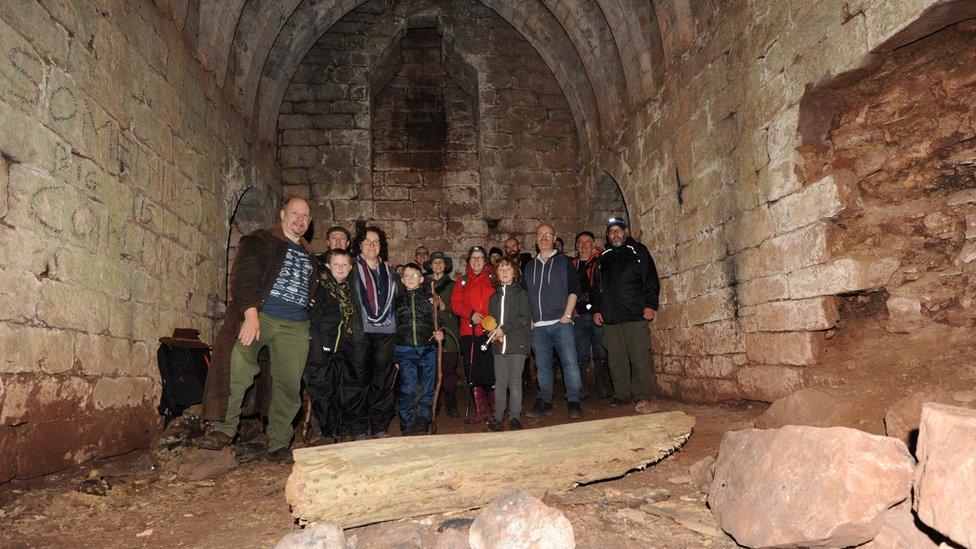
This cavern underneath the ruins of Yester Castle near Gifford was supposedly built by goblins
The society has embarked on eerie walks steeped in folklore, explored an underground chamber near Gifford in East Lothian - supposedly built by goblins - and ventured to Loch Ness in the hopes of catching a glimpse of the elusive monster.
"If Nessie had any sense the weather was so bad, he/she or it would have stayed away to be quite frank," Gordon said.
The society is making preparations to celebrate its 25th anniversary in April.
Gordon, who is a secondary school science teacher, attributes the society's enduring success to the dedication of its members.
"There is a core group who comes to most of the meetings we have and then there are the people who only come to the topics that interest them," he says.
"Fortunately, there is enough interest in Edinburgh to be able to sustain it."
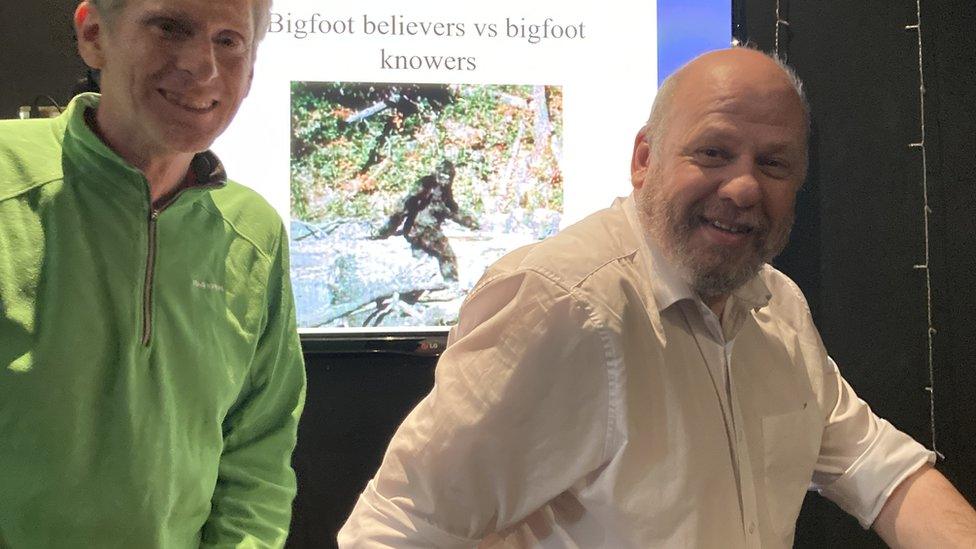
Eddy Cory (left) was among one of the first members of the Edinburgh Fortrean Society
In this unique community, open-mindedness prevails. Forteans, while sceptical, harbour an insatiable curiosity for the unexplained.
"Forteans are people who are interested in these things, they don't necessarily believe in them. But if the evidence leads in that direction they are quite happy to take it on board," Gordon says.
Related topics
- Published26 August 2023
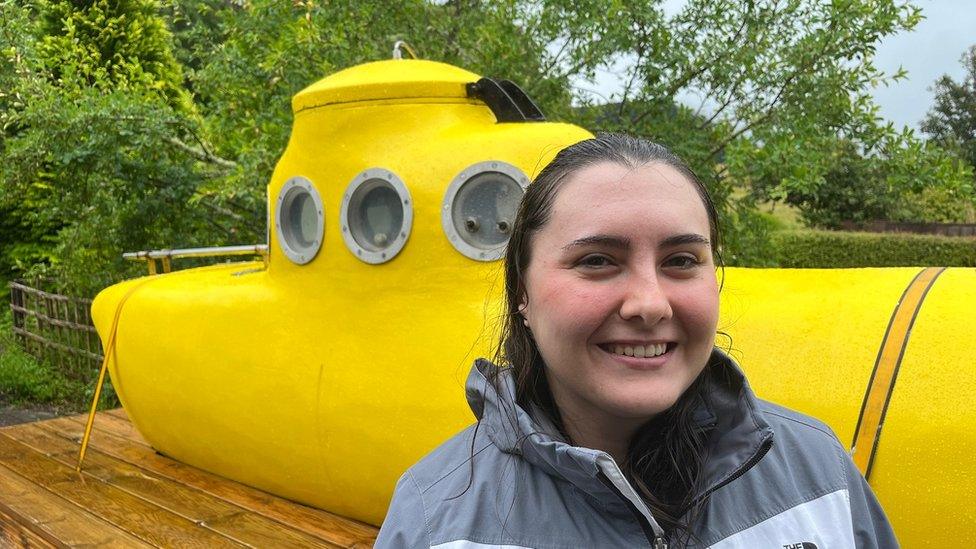
- Published9 November 2019
